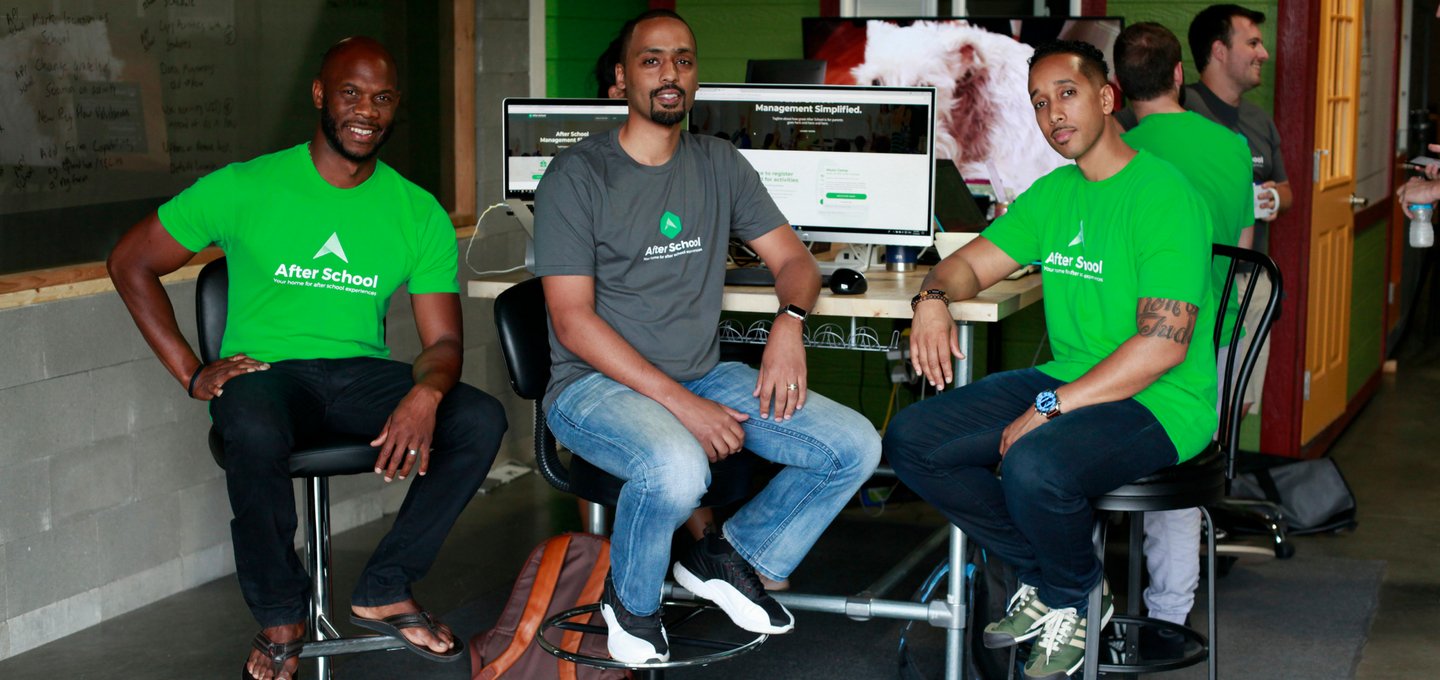School sports get an upgrade with AfterSchool HQ
Metro Indianapolis kids aren’t engaging in after school sports, according to statistics from Indianapolis Public Schools, but three entrepreneurs developed an idea that’s now being rolled out to 60 IPS schools in an attempt to get more kids into sports and on their way to greatness.
It started in 2015 when three parents were frustrated at the systems in place to get their own children involved in school sports. Darye Henry and San Pathak had been coworkers at a tech venture together before moving onto new businesses, while Denzil “Val” Crooke was part of a company based in Launch Fishers. As one may expect from the close-knit Indy tech ecosystem, they met and began freely exchanging their thoughts, both as parents and programmers. Together, they identified the pain points that kept kids from finding their spirit in sport.
The challenges Darye and San experienced were apparently the same problems other parents had, too. Jamal Smith, formerly the IPS Athletic Director and now the founder of The Lead Change Project, has been working on big plans to engage more kids in after school sports for several years. When Jamal began his time with IPS during the 2015-2016 school year, his own research unearthed that participation in sports within IPS was at 19 percent while the national average was over 50 percent.
What’s more, Jamal also discovered that children in urban schools were participating in lower numbers than children in suburban schools; the challenge facing IPS was systemic across the country. “We started thinking about how to offset that,” Jamal said. “We looked toward increasing programming and the number of opportunities to play while also developing the culture within the school to get kids more interested.”
That’s when Darye, San and Val decided to build AfterSchool HQ, an after school program management software, which is being implemented in dozens of schools across the Indianapolis Public School athletics system. The software provides kids with access to sports, administrators with loads of data and parents with the security of knowing where their kids are.
The product itself solves problems for multiple audiences: each school has an activity homepage, with admin access to create and manage lists of activities available at the school, as well as a panel of analytics on participation and engagement. Students are able to access their portal and find out information about their chosen activities. Parents are able to see what their kids are involved in and where they should be after school.
To develop this product, the AfterSchool team leveraged their connections within the Indy tech community. The company operates out of a space in Launch Fishers, though they’re also networked into plenty of places in the tech ecosystem. As the current CTO of DeveloperTown Starts, Darye helped access resources that closed some of the gaps in the young venture.

Last year, the team took their program to IPS, eager to share the fruits of their labor with educators who could use the product. It was a rapid success. After completing pilot programs at a few schools, AfterSchool is now taking on registration and management of all sports activities in about 60 of IPS’s K-8 schools this fall. “Our system will be used to set up teams, divisions, and schedules, as well as handling payments and communication,” San shared. “In order to do this, we are working closely with district representatives, Athletic Directors and other stakeholders to ensure the roll out is successful.”
IPS District Athletic Director Darren Thomas has worked with AfterSchool throughout the implementation process and has enjoyed discovering what the software brings. “Working with Afterschool HQ has been a great experience,” he said “They’ve been working really hard and have been very flexible in order to make sure they capture our needs and ensure that what they’re putting together is in-line with our overall vision.”

Educators are currently climbing the learning curve, but Darren is bullish on the future: “Once our team gets familiar with the platform, I’m confident things will run smoother and we’ll be able to collect and reference critical information in addition to being able to handle the basic needs of our programs.”
AfterSchool HQ dreams big for the future
Although the company now targets participation rates, AfterSchool is preparing to track other KPIs to demonstrate the impact they’re making. One such indicator of success will be the identification of more partners who can host more diverse activities, like science, chess or robotics clubs.

There’s also potential to streamline some of the processes that schools undertake to host and manage these activities. For example, service providers have a sometimes arduous process working with schools on getting their clubs set up and running. AfterSchool seeks to smooth out that process in future rollouts. “They’ll come to us to register, and then they’ll start having access to multiple schools,” said Darye. Security measures like background checks will still be implemented, ensuring it’s just as safe a process as before; however, a faster flow of information can bring more opportunities to more kids. “The plan is to reduce the friction it takes to form partnerships.”
When Jamal left IPS and launched The Lead Change Project, the participation percentage in sports at IPS schools finally passed 30 percent, but he believes there is still much more room for development in encouraging inner-city youth to get involved in sports. “The picture is bigger than just participation,” he said. “Participation is the foundation, but why should people care about that? We need to show the intangible benefits that come along with participation. If you increase the number of kids who are playing, then those kids are less likely to experiment with drugs and alcohol, or to become teenage parents; graduation rates rise, and schools, districts, and cities become better.”
It seems only natural, then, that The Lead Change Project is partnering with AfterSchool on ways to use their data gathering tools to track success indicators for the school programs Lead Change supports, which include plans to expand beyond Indy. “We’re still developing the framework with AfterSchool HQ, but we’re gathering data in order to have a comprehensive collection,” said Jamal. “By the end, we plan to be able to show how something as simple as sport can have an impact on how we live.”
The company also has big dreams and plans to grow. While they’re focused on IPS’s rollout now, that doesn’t stop them from keeping their horizons broad. “We want to go school by school, district by district, city by city,” said Darye. “This system can create a huge impact, and we want this for every student and parent, not just in our city but across the U.S. We definitely want to expand, to get anywhere where parents can find us. We want to help parents, to make it so that they don’t have to worry about their kids.”
Truly, that sentiment is at the heart of this venture: it’s a mission of supporting parents and kids in unlocking new opportunities and nurturing skills that can create a meaningful difference in students’ lives. “We’re all united by a desire to give back,” said Darye. “We’ve been blessed to have opportunities, and I’ve recognized that people gave me opportunities in my life. We can give back through a platform that enables others to have opportunities and create aspirations. We want that kind of long-term impact: kids get involved in activities, they get into STEM, and then they go to college. They don’t know they have skills until they use them.”
Discover other ways the Indy tech community is giving back to schools.




